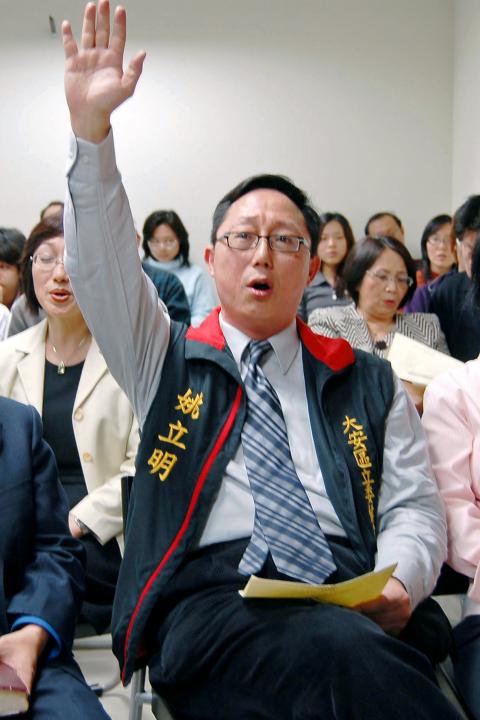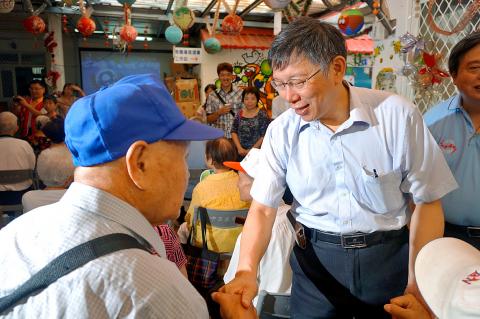Former New Party legislator Yao Li-ming (姚立明) has given his nod to independent Taipei mayoral candidate Ko Wen-je’s (柯文哲) invitation to join his election campaign team, saying he hopes the move can help usher in change between the opposing pan-blue and pan-green camps.
Now a political commentator, Yao was once a key figure in the anti-corruption movement, or the so-called “red-shirt army,” in 2006 against then-president Chen Shui-bian (陳水扁).
Yao is also a member of the pan-blue, pro-unification New Party.

Photo: CNA
Ko’s recruitment of Yao is widely viewed as an effort to broaden his electoral base.
Yao said in a statement posted on Facebook early yesterday morning that before making the final decision, he had taken time to ponder and weigh different factors, “but the determining factor is my wish to prove with this move that the deep-seated blue-green opposition can be changed.”
“Ko came from a family that had suffered from the 228 Massacre, while my parents came from China. Ko is green-leaning and I was once a New Party member. He was Chen Shui-bian’s physician and medical adviser, while I was the deputy commander-in-chief of the red-shirt army,” Yao said.

Photo: Tu Chu-min, Taipei Times
Out of all these differences, “there is something that we have in common,” he said.
“Neither of us wants to sit idly while witnessing Taiwan get drained away by the endless vicious blue-green infighting,” he said.
Yao underscored the consensus he had reached with Ko to look beyond political colors and focus on “black and white, and right and wrong,” saying that he expected the year-end mayoral election to be “not only an election, but also a civic movement that stops Taiwanese politics from descending into depravity.”
Former Democratic Progressive Party chairperson Frank Hsieh (謝長廷) lauded Yao’s decision and said on Facebook that Yao’s joining the campaign has made the goal of “transcending blue and green” one step closer.
However, given Yao’s background and past comments, there will no doubt be plenty of noise about his teaming up with Ko, Hsieh said.
Taipei Veterans General Hospital physician Kuo Cheng-deng (郭正典), a supporter of the former president and a member of his all-volunteer medicall team, said that Ko’s move might put off Chen supporters.
Janice Chen (陳昭姿), also a member of the medical team, agreed, saying that it would be even stranger if no one protests against Yao joining Ko’s campaign team.
However, “for the time being, [I] believe that as Yao has accepted Ko’s offer, he is willing to understand and assist what Ko has done so far to rescue the former president, whom Ko believes has suffered from political persecution,” she said.
A report by the Chinese-language Apple Daily yesterday said that Yao supports medical parole or home-based medical care for Chen if that is what the hospital suggests.
However, if the hospital says he can be treated behind bars, Chen should remain in prison to serve his sentence, he was reported as saying.

SECURITY: As China is ‘reshaping’ Hong Kong’s population, Taiwan must raise the eligibility threshold for applications from Hong Kongers, Chiu Chui-cheng said When Hong Kong and Macau citizens apply for residency in Taiwan, it would be under a new category that includes a “national security observation period,” Mainland Affairs Council (MAC) Minister Chiu Chui-cheng (邱垂正) said yesterday. President William Lai (賴清德) on March 13 announced 17 strategies to counter China’s aggression toward Taiwan, including incorporating national security considerations into the review process for residency applications from Hong Kong and Macau citizens. The situation in Hong Kong is constantly changing, Chiu said to media yesterday on the sidelines of the Taipei Technology Run hosted by the Taipei Neihu Technology Park Development Association. With

CARROT AND STICK: While unrelenting in its military threats, China attracted nearly 40,000 Taiwanese to over 400 business events last year Nearly 40,000 Taiwanese last year joined industry events in China, such as conferences and trade fairs, supported by the Chinese government, a study showed yesterday, as Beijing ramps up a charm offensive toward Taipei alongside military pressure. China has long taken a carrot-and-stick approach to Taiwan, threatening it with the prospect of military action while reaching out to those it believes are amenable to Beijing’s point of view. Taiwanese security officials are wary of what they see as Beijing’s influence campaigns to sway public opinion after Taipei and Beijing gradually resumed travel links halted by the COVID-19 pandemic, but the scale of

A US Marine Corps regiment equipped with Naval Strike Missiles (NSM) is set to participate in the upcoming Balikatan 25 exercise in the Luzon Strait, marking the system’s first-ever deployment in the Philippines. US and Philippine officials have separately confirmed that the Navy Marine Expeditionary Ship Interdiction System (NMESIS) — the mobile launch platform for the Naval Strike Missile — would take part in the joint exercise. The missiles are being deployed to “a strategic first island chain chokepoint” in the waters between Taiwan proper and the Philippines, US-based Naval News reported. “The Luzon Strait and Bashi Channel represent a critical access

Pope Francis is be laid to rest on Saturday after lying in state for three days in St Peter’s Basilica, where the faithful are expected to flock to pay their respects to history’s first Latin American pontiff. The cardinals met yesterday in the Vatican’s synod hall to chart the next steps before a conclave begins to choose Francis’ successor, as condolences poured in from around the world. According to current norms, the conclave must begin between May 5 and 10. The cardinals set the funeral for Saturday at 10am in St Peter’s Square, to be celebrated by the dean of the College